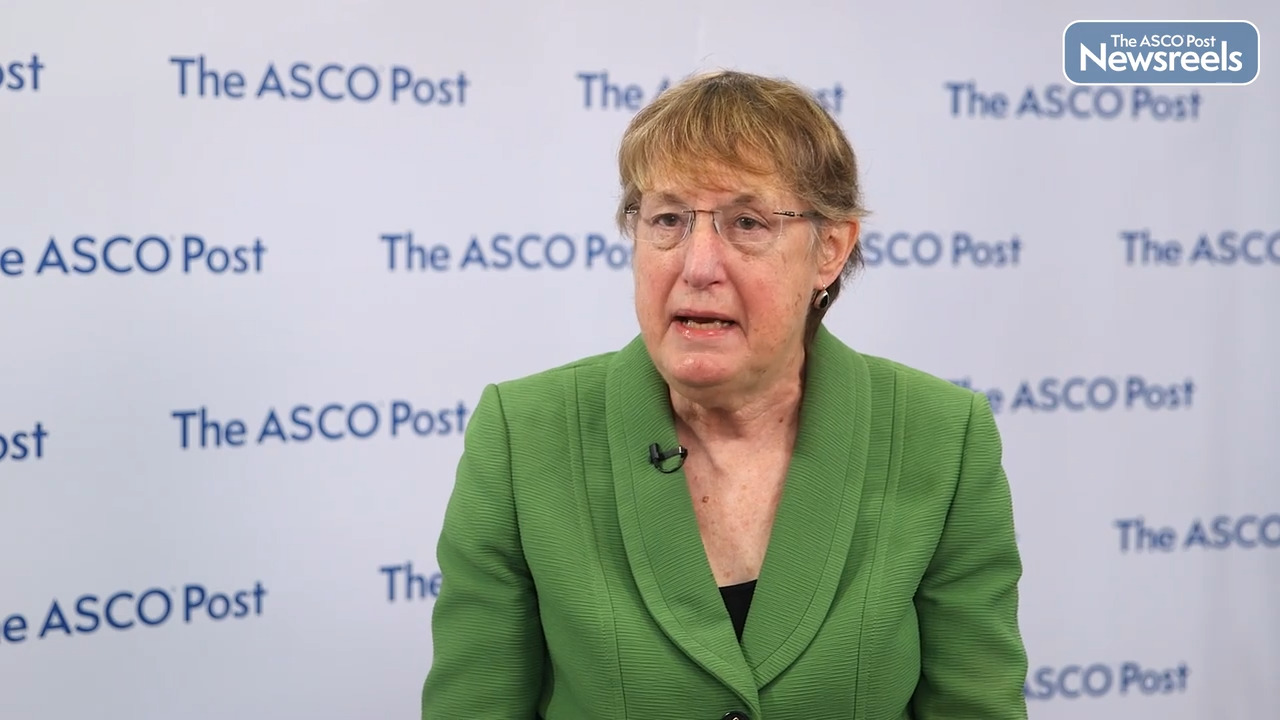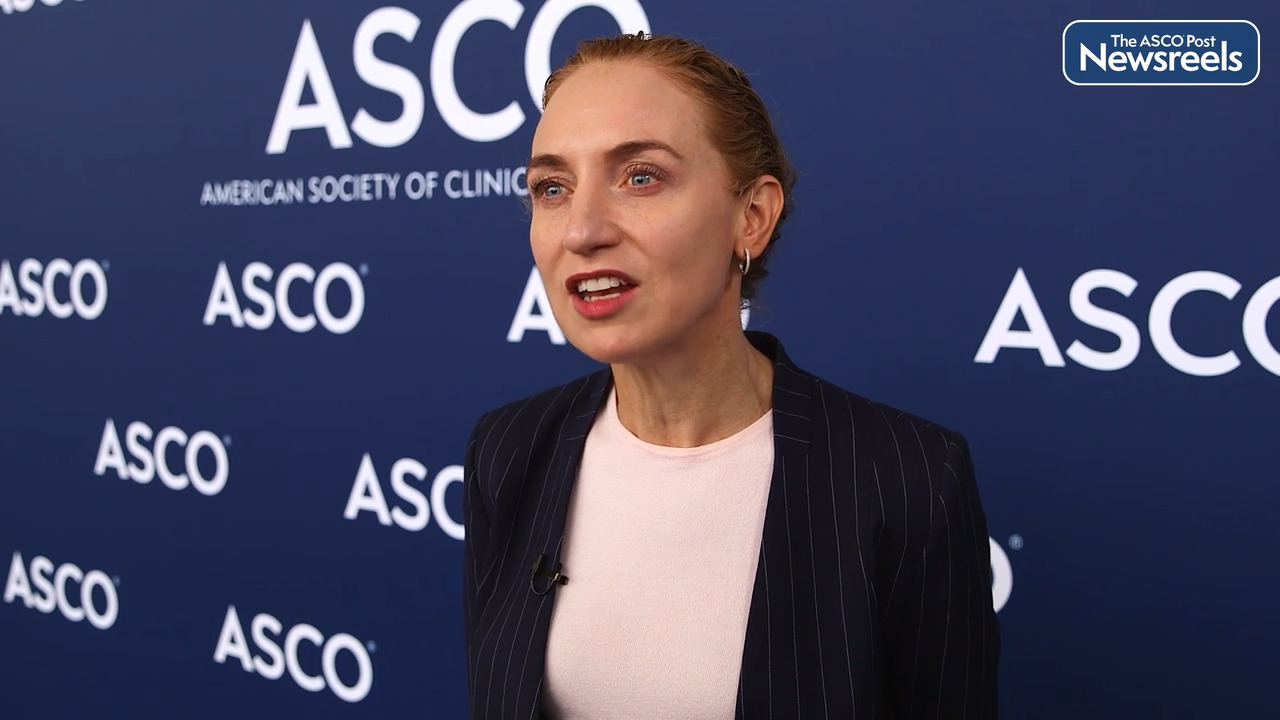Transcript
Disclaimer: This video transcript has not been proofread or edited and may contain errors.
Ann H. Partridge:
Veronique, it's been a pretty exciting ASCO to be a breast cancer doctor and researcher. Tell me about these new drugs, the antibody conjugates that are making such a splash.
Véronique Diéras:
Yes. And in fact, it took more than a century to have this targeted chemotherapy in order to improve the therapeutic index of cytotoxic chemotherapy. We were using TDM-1 for many years, but the third generation of ADC have some particular and mainly the bystander effect what we call. So there is a release of the cytotoxic, the payload of the antibody in the micro environment, leading to activity in tumor cells that might not express the target of the ADC. So the bystander effect may increase the efficacy of the ADC, but also perhaps the toxicity.
Ann H. Partridge:
So it allows for that tumor heterogeneity that we're learning so much about to be targeted?
Véronique Diéras:
Yes, exactly. Tumor heterogeneity and moreover targeting tumor cells with low expression. We know, for instance, with the anti-ER therapy, it was active only in case of early to free expression, like for TDM-1 trastuzumab. And then with this new ADC and the bystander effect, there may be some activity on HE.
Ann H. Partridge:
R2 low expression, breast cancer.
Ann H. Partridge:
Yeah, and what do you mean by activity? What have we seen both in your work and what we saw here at ASCA?
Véronique Diéras:
Trastuzumab deruxtecan was very active in HER positive breast, metastatic breast cancer, according to the [inaudible] breast of free. But at this ASCO, we heard about the activity in HER2 low breast cancer. We have already refuted data from the early clinical trials, but we have the release of destiny breast or four comparing Trastuzumab deruxtecan versus chemotherapy choice of the physician. In every treated patient mainly ER positive too low, but some were negative. And clearly the results were impressive with a superiority, not only in probation free survival, but in response rate and interval survival. That means a lot for our patient because I think there will be a major impact for two mobile in our clinical practice.
Ann H. Partridge:
Right. And it worked in all subsets. Right?
Véronique Diéras:
Exactly.
Ann H. Partridge:
All subtypes. Yeah. If they express some HER2, right?
Véronique Diéras:
Yes. HER2 low, even if it's ER negative. So what we may call triple negative by the definition of today, we may have some activity too.
Ann H. Partridge:
That's right. About 30% express some HER2 correct?
Véronique Diéras:
Yes.
Ann H. Partridge:
Something like that. And what about the tolerability of these drugs? What are we learning?
Véronique Diéras:
There's no new safety signals from what we know from destiny breast free, it was an update of the safety during this meeting too. But perhaps we have to be cautious about interstitial lung disease, ILD, but in fact the incidence on the severity of ILD decrease with the implementation of guidelines and perhaps more over treating less pretreated population.
Ann H. Partridge:
So now we have a number of monoclonal antibody, conjugate drugs, where do we go from here? Where do we need to go research wise and what can we do on Monday in the clinic?
Véronique Diéras:
So on Monday in the clinic, we may use precision risk account, but in fact, we have many ADC with different target from HER2 low from HER3 and from [inaudible].
Véronique Diéras:
And we have activity, I think HER3, we have as a preliminary development, but it's very exciting data. We have from the phase one and two study, but for tomorrow, what we need to know the best, we will address this ADC on the sequencing, the choice of the ADC for each patient. So today we say, considering the result we have with Trastuzumab [inaudible] HER2 low, ER positive, I will say the best choice will be Trastuzumab deruxtecan because we have an impact on world survival, but we may have activity with Trop2 ADC. So we have for the next future to evaluate the sequencing of this ADC, to evaluate the mechanism of resistance, because it'll have an important value to set the sequence. And also perhaps combination because we know from cyto toxic chemotherapy. When we combine with other drug immune checkpoint inhibitor, PAP inhibitor, sometimes we may have increase of activity. So we have a lot. I think it's the beginning of the story of it, in fact.
Ann H. Partridge:
So the beginning, and wouldn't it be nice if we could have a cocktail and then move it into the earlier stage setting and effect more cures?
Véronique Diéras:
Yes.
Ann H. Partridge:
That's what we want to see ultimately.
Véronique Diéras:
Yes, exactly. I was thinking of that, looking to the result of this of study of four. When I see the response rate in every pre-treated population. What may be the impact for instance, in the new adjuvant setting for ER positive, HER2 low, because we know usually the PCR is very low in ER positive diseases. So perhaps we have to evaluate Trastuzumab in the adjuvant setting to increase the PCR to have an impact on the cure of the patient.
Ann H. Partridge:
All right. I heard it here. I think that's the future. Thank you so much Veronique for joining me.
Véronique Diéras:
Thank you.





